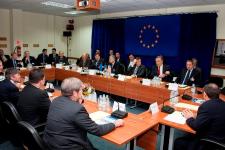 Bosnian leaders are pondering a revised package of constitutional changes offered to them by European Union and US negotiators, in their latest attempt to help end country’s political deadlock.
Bosnian leaders are pondering a revised package of constitutional changes offered to them by European Union and US negotiators, in their latest attempt to help end country’s political deadlock.
The Western negotiating team met Bosniak (Bosnian Muslim) and Croat leaders in Sarajevo on Tuesday, and is meeting Bosnian Serb officials in Banja Luka on Wednesday, in order to present a new version of a reform package that has been discussed since early October.
“The new proposal is significantly below the initial version of the Butmir constitutional package and as such is unacceptable to the Social Democratic Party (SDP),” said the main opposition SDP party in its statement following the meeting in Sarajevo.
SDP said that the new proposal does not improve the functionality of the country and offers the opportunity for yet more legal ambiguities and political quarrels.
In addition to the SDP, the second-strongest Bosniak Party for Bosnia and Herzegovina, SZBH, also said that the new proposal goes “below” the initial package, that it has incorporated Bosnian Serb, but no Bosniak proposals.
The main Bosniak Party of Democratic Action, SDA, and two Bosnian Croat parties, HDZ and HDZ 1990, are expected to make their positions public on Wednesday and Thursday.
The so-call Butmir package was put together in September and October behind closed by top EU and US officials, in an attempt to break Bosnia’s political deadlock. The package proposed a set of constitutional changes whose acceptance would improve the functionality of country’s cumbersome administration and allow for the closure of the Office of the High Representative, OHR.
The OHR’s position has been increasingly questioned over the past few months afte rBosnian Serb leaders have defied, challenged and even mocked its decisions. Having been left without much international support in the past several years, the OHR has effectively been unable to use its broad governing powers, whether to defend itself or the Dayton peace accord.
Most of the main ruling and opposition parties remain loyal to their maximalist demands and have rejected some or all of the Butmir proposal. Despite several unsuccessful meetings, Western diplomats have strived to keep the negotiating process open. In the meantime, representatives of key international powers engaged in peace-implementation in Bosnia have delayed the closure of the OHR until February 2010. The EU has also extended the mandate of the EU-led peace-enforcing mission, EUFOR, until November 2010.
According to Western diplomats, the EU-US negotiators will give the Butmir package one more chance until the end of the year. In case of failure, the West is expected to abandon the issue for some time as Bosnia enters an election year. In such an environment, further insistence on constitutional changes could increase tensions further.
In case the Butmir package fails, some analysts have urged the internaitonal community to consider a new approach in Bosnia and continue its presence in the country.
 Eurasia Press & News
Eurasia Press & News


